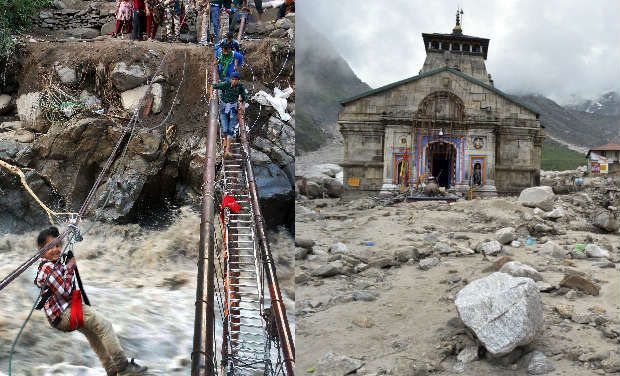What Are Exoplanets And How NASA Detects Life Beyond Our Solar System
Bharti Airtel Set To Acquire Telenor India Within This Year
Google Celebrates NASA’s Discovery Of Seven Earth-Like Planets With An Animated Doodle
Some Home Remedies That Might Sound Bizarre But Actually Work Like A Charm
Akshay Kumar Feels He Has Made Enough Money, Now Wants To Focus On Content & Characters
Delhi ATM Dispenses Fake Rs 2000 Notes From ‘Childrens Bank of India’ With ‘Churan Lable’
Adolf Hitler’s Personal Telephone During World War II Is Up For Auction In The US
From Salman Khan To Rekha, Neil Nitin Mukesh’s Wedding Reception Was Quite A Starry Affair
I Was There After The Uttarakhand Floods In 2013, And Here’s Why That Image Stuck With Me
Long weekends are a respite, especially if you have just started working and realized that you have lost a sense of control over your hours to function productively. Long weekends are opportunities for a getaway. Long weekends are mini-vacations. What I did not know was that a long weekend would acquaint me with a fear that I nestled latently for over a year. The mountains were calling, but I couldn’t go’ The urban landscape is crammed with concrete matchboxes and innumerable vehicles. So, anything that is remotely aesthetically pleasing and natural is a breath of fresh air. That this fresh air would become suffocating wasn’t something I had imagined. My visit to Dehradun for an internship coincided with the flash floods in Uttarakhand in 2013. Two weeks later, I got the opportunity to travel over 200 kilometres to a place called Ukhimath, around 30 kilometres short of Kedarnath, for relief work. The catastrophe had resulted in unprecedented loss and destruction. From blaming Mother Nature to labelling it as God’s vengeance to wipe off the ‘uncultured western’ souls, the calamity was even dismissed as a case of ‘bad timing’. I saw the chance as a greater commitment to my work. I felt that it would be a huge learning experience, and at a personal level, saw it as my ‘calling’. Within a few hours of driving, we reached Rishikesh. The Rishikesh that I now saw was very different from the ‘rafting, bonfire and eating maggi by the river’ photos facebook is usually flooded with. All I could see was silt. So much of it that the river was in shades of brown and its fury scaled on the landscape of the river bed. Five more minutes and I saw two people trying to salvage the remnants of their home. If this was the extent of devastation a few kilometres up the altitude, it was horrifying to think what lay ahead in the 200 kilometres that we were yet to cover. During the 10 day journey, I saw the aesthetic side of nature turn ugly and unforgiving. We travelled by roads that had been reduced to loose soil with coal slipping into rivers with altered courses. The river no longer felt like a sign of vitality as it turned into a deathbed, some bodies washed ashore while some did not have the privilege of a funeral. The irony of being rescued after death seemed unsettling. The meaning of luxury had changed for me too. There was no electricity and the generator was run for only an hour each day. My phone’s battery wasn’t my central concern anymore. Potatoes and maggi replaced all fancy eateries. The smell of wet soil and rains each night was a sign of more landslides and more bald heads the next morning. The journey back seemed more unrealistic and horrifying. Finding out that the routes you came by no longer exist isn’t one of the best feelings. The alternate routes weren’t devoid of the devastation either. I had no idea that while queuing up for hours in traffic, talking to people, and travelling over the leftover topography, I was soaking in the images of loss and destruction that would turn into a fear I didn’t realize till I returned to the mountains. When I got back and documented my visit, validated facts and read a range of news pieces, I relived fragments of the journey. I dismissed it as I saw it as a residual feeling I did not want to confront and assumed it would die a natural death. Time is a healer. Maybe not. The only uneasy feeling altitude brought to me before was that of motion sickness. A year later during a drive to Shimla, my fear materialized into something that I had never seen as a part of me. A thing of beauty was no longer a joy. A subsequent plan to Kasol was made 2 months later. I preferred the reassurance and safety of the plane and flat landform and withdrew myself from the plan. Maybe for those who survived and lost, in parts and full, a sense of belonging forgives calamities. Perhaps, the attitude of the state to normalize calamities as an yearly affair has become the story of many lives. A month later, I have a mail sitting in my inbox to volunteer for the relief and rehabilitation work at Jammu & Kashmir. My conscience severely judges my fear, and maybe tomorrow, I will have another rationale to justify my guilt to my conscience. The mountains are calling, maybe I will go.





